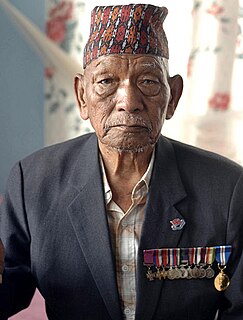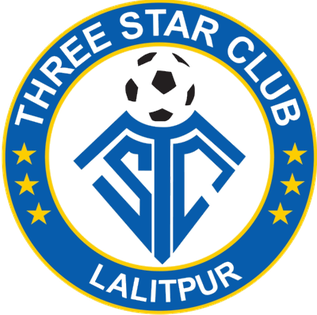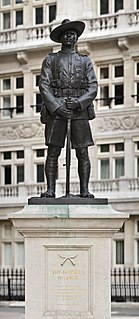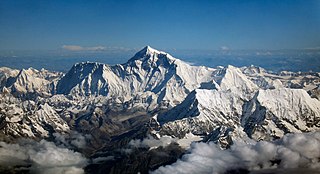
Brigade of Gurkhas is the collective name which refers to all the units in the British Army that are composed of Nepalese Gurkha soldiers. The brigade, which was 4,010 strong as of 1 April 2021, draws its heritage from Gurkha units that originally served in the British Indian Army prior to Indian independence, and prior to that served for the East India Company. The brigade includes infantry, engineering, signal, logistic and training and support units. They are known for their khukuri, a distinctive heavy knife with a curved blade, and have a reputation for being fierce and brave soldiers.

The Gurkhas or Gorkhas, with endonym Gorkhali, are soldiers native to South Asia of Nepalese nationality and Indian Gorkha ethnicity recruited for the British Army, Nepalese Army, Indian Army, Gurkha Contingent Singapore, Gurkha Reserve Unit Brunei, UN peacekeeping forces and in war zones around the world. Historically, the terms "Gurkha" and "Gorkhali" were synonymous with "Nepali", which originates from the hill principality Gorkha Kingdom, from which the Kingdom of Nepal expanded under Prithivi Narayan Shah. The name may be traced to the medieval Hindu warrior-saint Guru Gorakhnath who has a historic shrine in Gorkha District. The word itself derived from Go-Raksha, raksha becoming rakha (रखा). Rakhawala means 'protector' and is derived from raksha as well.

The Royal Gurkha Rifles (RGR) is a rifle regiment of the British Army, forming part of the Brigade of Gurkhas. Unlike other regiments in the British Army, RGR soldiers are recruited from Nepal, which is neither a dependent territory of the United Kingdom nor a member of the Commonwealth.

Tul Bahadur Pun was a Nepalese Gurkha recipient of the Victoria Cross, the highest award for gallantry in the face of the enemy that can be awarded to British and Commonwealth forces. He later achieved the rank of Honorary Lieutenant. In addition to the Victoria Cross, Pun was awarded 10 other medals, including the Burma Star.

The 3rd Gorkha Rifles or Third Gorkha Rifles, abbreviated as 3 GR is an Indian Army infantry regiment. It was originally a Gurkha regiment of the British Indian Army formed in 1815. They were present at a number of actions and wars including the siege of Delhi in 1857 to the First and Second World Wars. After the Partition of India in 1947 the regiment was one of the six Gorkha regiments transferred to the Indian Army as part of the Tripartite Agreement signed between India, Nepal and Britain at the time of Indian independence. Prior to independence, the regiment was known as the 3rd Queen Alexandra's Own Gurkha Rifles. In 1950 the regiment's title was changed to 3rd Gorkha Rifles. Since 1947 the regiment has participated in a number of conflicts including the 1947 and 1971 wars against Pakistan.

Dharan is a sub-metropolitan city in Sunsari District of Province No. 1, Nepal, which was established as a fourth municipality in the Kingdom in 1958. It is situated on the foothills of the Mahabharat Range in the north with its southern tip touching the edge of the Terai region at an altitude of 1148 ft (349m). The Koshi highway runs through the heart of the city thus connecting it with the provincial capital of Biratnagar as well as the Itahari junction of the east–west Mahendra highway, and the Nepal-China border of Kimathanka.
The Tripartite Agreement between the United Kingdom, India and Nepal was a treaty signed in 1947 concerning the rights of Gurkhas recruited in military services of United Kingdom and India. This agreement does not apply to Gurkhas employed in the Nepalese Army. Under the agreement, 4 Gurkha regiments of British Army were kept while 6 joined the Indian army. As of 2020, India has 39 Gorkha battalions serving in 7 Gorkha regiments. Those transferred to the British Army were posted to other remaining British colonies. In Malaya and Singapore, their presence was required in the Malayan Emergency, and they were to replace the Sikh unit in Singapore which reverted to the Indian Army on Indian independence. Those units in Malaya and Singapore, after these British colonies gained independence, are still part of Brunei and Singapore armed forces respectively.

The 7th Gurkha Rifles was a rifle regiment of the British Indian Army, before being transferred to the British Army, following India's independence in 1947 and after 1959 designated as the 7th Duke of Edinburgh's Own Gurkha Rifles

Three Star Club is a Nepali professional football club based in Patan, Lalitpur, that competes in the Qatar Airways Martyr's Memorial A-Division League, the top flight of Nepalese football.

The Nepalese Army or Gorkha Army is the armed military Land warfare force of Nepal and a major component of the Military of Nepal.
The Gurkha Welfare Trust is a British charity established in 1969. It is the principal UK charity for the provision of aid to Gurkha ex-servicemen and their dependants in their homeland of Nepal, and increasingly in the UK and elsewhere.

Since the independence of India in 1947, as per the terms of the Britain–India–Nepal Tripartite Agreement, six Gorkha regiments, formerly part of the British Indian Army, became part of the Indian Army and have served ever since. The troops are mainly from ethnic Gurkha community of Nepal. They carry their signature, a Kukri knife, with them. A seventh Gorkha Rifles regiment was re-raised in the Indian Army after Independence to accommodate Gorkha soldiers of 7th Gurkha Rifles and the 10th Gurkha Rifles who chose not to transfer to the British Army.
British Gurkhas Nepal (BGN) is an administrative organisation of the British Army.

The following outline is provided as an overview of and topical guide to Nepal:
The community of Nepalis in China consists of Nepalese immigrants and expatriates to China as well as Chinese citizens of Nepalese descent.

The Memorial to the Brigade of Gurkhas on Horse Guards Avenue, Whitehall, London, was unveiled by Queen Elizabeth II on 3 December 1997. This was the first memorial to Gurkha soldiers in the United Kingdom, and was occasioned by transfer of their headquarters and training centre from Hong Kong to London in 1997. The sculptor was Philip Jackson, working from a statue of 1924 by Richard Reginald Goulden in the Foreign and Commonwealth Office, and the plinth was designed by Cecil Denny Highton.

The Gurkha Museum commemorates the service of Gurkha soldiers to the British Crown, a relationship that has endured since 1815. It is located in Winchester in Hampshire, England and is part of Winchester's Military Museums.

Province No. 1 is the easternmost of the seven provinces established by the new constitution of Nepal which was adopted on 20 September 2015. The province covers an area of 25,905 km2, about 17.5% of the country's total area. With the industrial city of Biratnagar as its headquarters, the province covers other major eastern towns including Damak, Dharan, Itahari, Inaruwa and Birtamod and includes several mountains including the Everest, Kanchenjunga, and Ama Dablam. Koshi – the largest river of the nation, circumvents the province's western boundary. Adhering to the first-past-the-post voting system issued by the Constituency Delimitation Commission, the province hosts 28 parliamentary seats and 56 provincial seats.

The Band of the Brigade of Gurkhas is a British military band based at Shorncliffe. It supports the British Army and the Brigade of Gurkhas in ceremonial settings, pass off parades, concerts and many other musical support tasks. It is a directly reporting unit of Regional Bands HQ (RBANDS) under London District, which sponsors the promotion of British military music. It is one of two 'Light Pace' regular wind bands in the British Army.. The band has travelled extensively since its inception, travelling more recently to The Falkland Islands, Australia, Brunei, Canada, France, Germany, Nepal, Belgium. Today, musicians from Nepal are chosen during their Gurkha military training. Their musical instruction commences first under Director of Music (DOM) and then under supervision of the Royal Military School of Music.
Gurkha Memorial may refer to:













